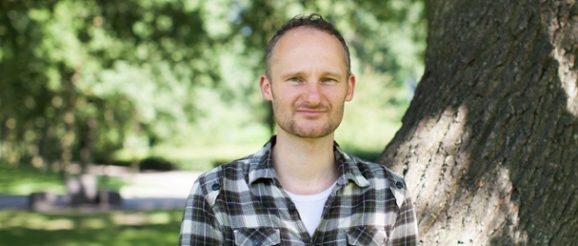Evolution as the origin of hypotheses about human behaviour – University of Amsterdam

Evolutionary game theory versus classical game theory
Evolutionary game theory constitutes an important tool in Van Veelen’s research. He defines the concept of game theory succinctly as follows: ‘It’s a mathematical description of strategic behaviour.’ Classical game theory might be familiar to people through games such as the prisoner’s dilemma. So what’s the difference between the evolutionary and classical versions of game theory?
‘Classical game theory assumes that all individuals always act rationally: everybody understands the game perfectly, always looks at it from the perspective of other players and considers at all times what those players might do. In evolutionary game theory, such rationality is not a basic axiom. Rationality may well be something that evolves but this need not be the case.’
On the one hand, evolutionary game theory is not as smart as classical game theory. ‘Not as smart, in the sense that people just do whatever it is they do and selection ensures that different behaviours come and go.’ On the other hand, evolutionary game theory can answer questions that classical game theory is silent on. ‘These include questions like where rationality comes from, why we want the things we want, or why we’re sometimes altruistic even though selfish behaviour often seems more lucrative.’
Population structure
The structure of the population could play a role here. As Van Veelen explains: ‘In some population structures, you can’t avoid dealing with people who, on the whole, are very much like yourself.’ It is like trees that stand close together and are similar because they often have the same parentage. ‘So if you’re kind and cooperative, the same is likely to be the case for others in your environment.’ In this way, kindness might evolve over time even if, from an individual perspective, it is not necessarily an optimal form of behaviour.
But the answer to the question of why people have come to be more social in their behaviour than any other animal species perhaps lies in a different direction. Van Veelen elaborates: ‘We’re not simple grazers, each doing our own thing independently of the others. We’re a technological species. We’re hunters who use tools and we’re clever, knowledge-intensive gatherers. And many of the things we do, we do together. If you want to invest in a joint plan, you must be able to rely on the other parties. If you’ve made some tools or a boat to go fishing, for instance, you want to be sure that the others won’t make off without you, taking the boat, the tools or the catch.’ This requires commitment. ‘And this, in turn, is a function of delayed gratification. We, as humans, are now able to show patience or put effort into something because we know we’ll reap the rewards later.’
Behavioural economics
Such research topics, on the interface between economics and biology, are of interest because they take us back to the origin of human behaviour. As Van Veelen points out: ‘The behaviour we study as part of behavioural economics comes from somewhere. Our ancestors made decisions determining if they would live or die or if they would or would not have children. So the behaviour we display is the effect of selection. I can indeed not imagine our hypotheses about human behaviour originating in anything more fundamental than evolution.’
Whatever its origins, this high-tech, talking, calculating species with an obsession for justice has a huge impact on our planet. ‘Take agriculture. It has existed for ‘only’ 10,000 years but, in this period, we’ve ended up in full control of the planet.’ Thanks to technology, there are many of us and each of us can be very destructive. When it comes to ‘welfare’, humankind is still doing very well but, at the same time, we are seriously harming the earth. ‘The destruction of the environment is the biggest threat to our welfare. To an economist such as myself, this gives much food for thought.’
